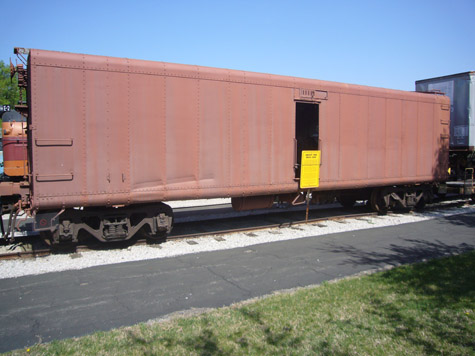
Milk Tank Car #1057 H.P. Hood (G.P.E.X.) built 1930
In this car the small sliding door above the side entry door was used for the milk loading hose. To keep the interior as clean as possible the entry doors were kept closed once the piping was hooked up except when a worker was going in or out. The tanks were emptied from the bottom using pipes routed out the large door. The tanks are canted slightly toward the center to make it easier to drain them. The car had electric agitation motors that were plugged in and their propellers stirred the milk in the tanks while it was being loader, or when waiting to be emptied. This distributed the butterfat in the milk and prevented the residue from sticking to the walls of the tank making cleaning easier. The motion of the car was expected to do this while the milk was being transported. The tanks in the car were made of stainless steel insulated with two inches of cork, not "glass lined" steel. No ice was used as the insulation in the cars was sufficient to keep the milk from warming too much. The large quantity of pre-cooled milk also did not change the temperature quickly. In one test milk was shipped from Wisconsin to Florida and the temperature only raised one degree in a trip of 101 hours. Once the tanks were emptied they were scrubbed clean by a worker who entered through the large oval door. They were then sterilized using steam and resealed. Regular inspections were made by local health authorities to insure cleanliness.
Close Window